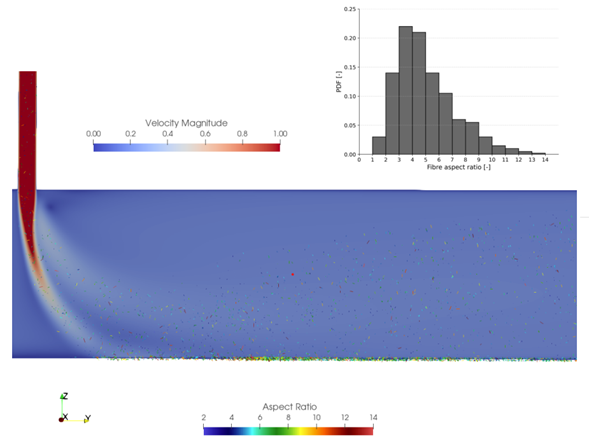Diego Fernando Garcia Gonzales

M.Sc. Diego Fernando Garcia Gonzales
PROJECT:
Two-three and four way coupling of suspended elongated particles in turbulent flows
Description:
The motion and interaction of elongated particles in turbulent flows are fundamental to many industrial and natural processes, such as fibre transport in papermaking, aerosol dispersion, filtration, and pneumatic conveying. Due to their non-spherical shape, such particles experience complex orientation-dependent forces and torques, leading to tumbling, rotation, and alignment with the flow. In dense suspensions, inter-particle collisions, lubrication effects, and hydrodynamic interactions strongly influence both particle behaviour and turbulence. Reliable prediction of these effects remains a central challenge in multiphase flow research.
This project focuses on the development and validation of advanced Euler/Lagrange models for turbulent flows laden with elongated particles, accounting for two-, three-, and four-way coupling between the phases. The research is conducted collaboratively by the Multi-phase Flow Working Group (MPS) and the Mechanical Process Engineering Institute (MVT) at Otto-von-Guericke University Magdeburg.
The MPS group performs experimental investigations and stochastic modelling of particle dynamics and collisions. Using a water channel with a particle-laden jet in crossflow, the translational and rotational motion of fibres is captured via high-speed stereoscopic shadow imaging, providing three-dimensional trajectories and orientation statistics. Complementary binary collision experiments between freely moving fibres are conducted to determine restitution and friction parameters for model calibration and validation. These experimental data serve as benchmarks for numerical simulations.

Figure 1. Particle injection with varying aspect ratios, showing velocity field contours and the experimental PDF of fibre shapes
In parallel, the MPS group develops a stochastic hard-sphere collision model extended for elongated particles and incorporating three-way hydrodynamic coupling. This approach enables computationally efficient simulations of fibre suspensions under turbulent conditions, implemented within RANS and LES frameworks such as OpenFOAM.
The MVT institute complements this work with particle-resolved DNS and soft-sphere CFD-DEM simulations to derive hydrodynamic and lubrication correlations, and to perform LES-based validation using the MultiFlow code.
Together, both groups aim to establish a validated, predictive modelling framework for turbulent flows with elongated particles, providing new insight and improved simulation capability for complex fibre-laden and particle-laden systems relevant to industrial applications.